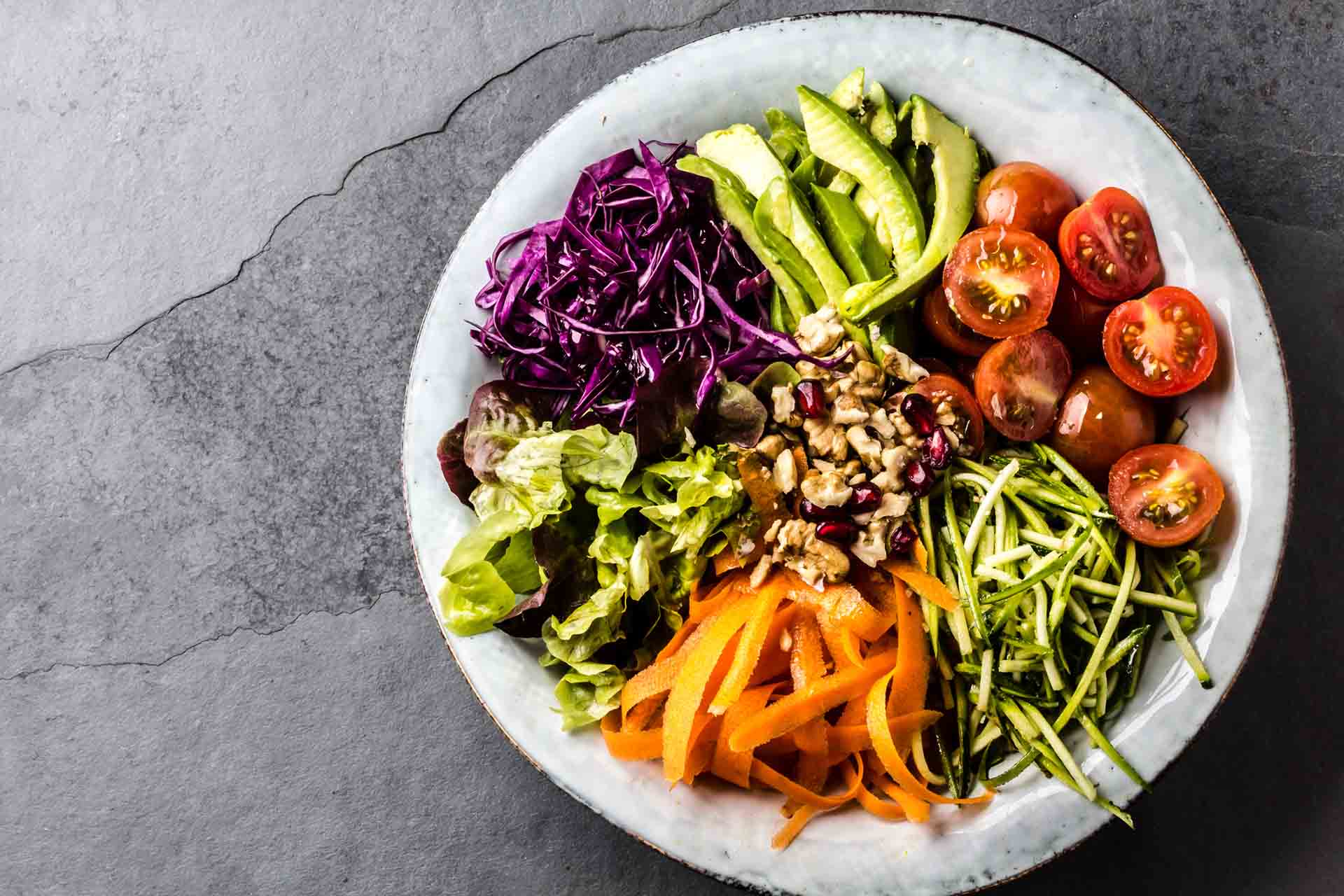Hidden Ingredients in Sugar Free Sauces: What to Watch Out For
Hidden Ingredients in Sugar Free Sauces: What to Watch Out For
Blog Article
Everything About Healthy And Balanced Food: Benefits of Enjoying Plant Based Choices
The discussion surrounding plant-based diet plans has gained significant focus in recent times. Many individuals are discovering the possible wellness benefits, dietary advantages, and ecological influences connected with these nutritional choices. As individuals become extra mindful of their food's impact on health and sustainability, inquiries occur about the usefulness of embracing such a lifestyle. What details modifications can one anticipate, and exactly how might these options reshape not only individual wellness yet also the world's future?
Understanding Plant-Based Diet Regimens
Although numerous individuals associate plant-based diet regimens primarily with vegetarianism or veganism, these diet regimens can encompass a large range of eating patterns that prioritize entire, minimally refined plant foods. Such diets typically consist of fruits, vegetables, entire grains, vegetables, seeds, and nuts, while getting rid of or restricting pet products. This adaptability enables individuals to tailor their dietary choices according to dietary requirements and personal choices. Some may adopt a largely plant-based diet plan while still periodically consuming meat or dairy, often referred to as a flexitarian technique. The emphasis continues to be on incorporating more plant foods, which can cause a diverse array of meals and flavors. Understanding these various analyses of plant-based consuming is crucial for valuing its availability and appeal in modern food culture.
Health Benefits of Plant-Based Foods
The health and wellness benefits of plant-based foods are considerable, providing a nutrient density benefit that sustains total wellness. Research shows that these foods can improve heart health and wellness and play an essential role in effective weight management. By integrating much more plant-based options, people may improve their dietary options and promote long-term health.
Nutrient Density Advantage
Nutrient thickness plays an essential role in the health and wellness benefits of plant-based foods, making them an engaging option for those seeking a balanced diet regimen. Plant-based foods, such as fruits, veggies, beans, nuts, and entire grains, are usually abundant in necessary vitamins, minerals, and antioxidants while being lower in calories. This high nutrient thickness permits individuals to consume less calories while still fulfilling their nutritional needs. In addition, these foods are loaded with dietary fiber, promoting digestive wellness and helping in weight administration. By incorporating nutrient-dense plant-based alternatives, consumers can enhance their total health and wellness, support their body immune systems, and decrease the risk of persistent diseases. Inevitably, the nutrient density of plant-based foods underscores their relevance in a health-conscious way of life.
Heart Wellness Enhancement

Weight Administration Support
In addition to promoting heart health and wellness, a plant-based diet can substantially help in weight management. This dietary approach highlights whole foods such as fruits, vegetables, beans, nuts, and whole grains, which are usually lower in calories and greater in fiber compared to animal-based items. The high fiber content assists increase satiety, lowering general calorie consumption. Moreover, plant-based diets are commonly rich in necessary nutrients while low in undesirable fats, making it less complicated to maintain a healthy and balanced weight. Plant Based Chicken. Research study shows that people who embrace a plant-based way of life often tend to have lower body mass indexes (BMIs) and experience more successful fat burning compared to those who take in meat-heavy diet regimens. As a result, welcoming plant-based alternatives is a tactical option for efficient weight monitoring
Nutritional Worth of Plant-Based Active Ingredients
Plant-based ingredients are rich in important nutrients, using a varied variety of vitamins, minerals, and anti-oxidants that add to total wellness. A contrast of healthy protein resources exposes that while pet products are typically deemed premium, several plant-based alternatives supply appropriate healthy protein and other useful compounds. Comprehending the nutritional value of these active ingredients can click over here now aid people make notified dietary choices.
Essential Nutrients in Plants
Nutrient-rich ingredients located in plants supply a diverse range of important vitamins and minerals that add substantially to general health and wellness. These ingredients are abundant in vitamins A, C, and K, which sustain immune function, vision, and blood clot, specifically. In addition, plants provide vital minerals such as potassium, magnesium, and calcium, crucial for heart wellness, muscle mass function, and bone stamina. The presence of fiber in plant-based foods aids digestion and advertises a healthy intestine microbiome. Antioxidants, located generously in fruits and vegetables, help combat oxidative stress and minimize inflammation. Furthermore, lots of plant foods are reduced in calories yet high in nutrients, making them a superb choice for those looking for to maintain a healthy weight while making certain optimal nutrient intake.
Contrasting Healthy Protein Resources
Protein sources differ substantially in their dietary profiles, with plant-based ingredients offering one-of-a-kind benefits. Unlike animal proteins, which often contain hydrogenated fats and cholesterol, plant healthy proteins tend to be lower in these harmful elements. Legumes, nuts, seeds, and whole grains are abundant in necessary amino acids, fiber, vitamins, and minerals. For circumstances, lentils offer high healthy protein material alongside substantial iron and folate, while quinoa is a full protein, supplying all 9 important amino acids. Additionally, plant-based healthy proteins are frequently come with by antioxidants and phytochemicals that sustain overall wellness. The shift to plant-based healthy protein sources not just boosts dietary consumption however additionally lines up with lasting dietary methods, lowering environmental effect and promoting long-lasting wellness benefits.
Ecological Impact of Plant-Based Eating
As recognition of environment change expands, many individuals are discovering lasting dietary choices that can considerably reduce their environmental impact. Plant-based eating has become a considerable contributor to minimizing greenhouse gas emissions, which are largely associated with animals production. The farming of fruits, beans, vegetables, and grains usually calls for less sources, such as water and land, contrasted to pet farming. Additionally, plant-based diets can cause lowered logging, as much less land is required for grazing livestock or growing animal feed. By moving in the direction of plant-based alternatives, consumers can sustain biodiversity and advertise healthier ecological communities. Overall, embracing plant-based eating not only advantages personal health but also represents an essential action towards environmental sustainability and conservation efforts.
Overcoming Common Misconceptions
While lots of people acknowledge the benefits of a plant-based diet, numerous misunderstandings typically prevent them from completely accepting this way of life. An usual idea is that plant-based diets lack adequate healthy protein; nevertheless, various plant resources, such as vegetables, nuts, and tofu, offer sufficient protein. In addition, some assume that this diet plan is expensive, when in fact, staples like beans, rice, and seasonal veggies can be fairly inexpensive. One more mistaken belief is that plant-based eating is overly limiting, whereas it really offers a varied range of tastes and foods. Many fret that a plant-based diet might lead to deficiencies, yet with appropriate preparation, individuals can get all required nutrients, consisting of vitamins and minerals, while appreciating a broad selection of delicious dishes.
Tips for Transitioning to a Plant-Based Way of life
Making the change to a plant-based lifestyle can be an improving experience, though it frequently calls for some guidance to navigate the first adjustments. Initially, individuals are motivated to begin gradually, incorporating more fruits, vegetables, vegetables, and entire grains right into their dishes while lowering meat and milk consumption. Meal planning is crucial; preparing a weekly menu can help alleviate the modification and avoid final harmful selections. Exploring brand-new dishes and cooking techniques can also improve the experience and preserve exhilaration concerning plant-based eating. Furthermore, signing up with support system or areas can give inspiration and share beneficial tips. Remaining notified regarding nutrition guarantees well balanced dishes, stopping shortages while promoting a healthy, satisfying plant-based lifestyle.

Delicious Plant-Based Meal Ideas
Discovering delicious plant-based meal concepts can motivate individuals to accept an extra nutritious diet. One prominent alternative is a hearty quinoa salad, featuring cherry tomatoes, cucumber, and a spicy lemon-tahini clothing. Another favorite is a mouthwatering lentil stew, loaded with carrots, celery, and fragrant herbs, ideal for a calming supper. For breakfast, overnight oats made with almond milk, chia seeds, and topped with fresh berries supply a nourishing beginning to the day. Additionally, a dynamic veggie stir-fry with tofu and a variety of colorful veggies can be a fast yet pleasing meal. Luscious avocado salute on whole-grain bread, sprinkled with flavors and seeds, uses a straightforward yet flavorful treat. These meals showcase the variety and richness of plant-based consuming.

Frequently Asked Questions
Can a Plant-Based Diet Regimen Supply Enough Healthy Protein?
The question of whether a plant-based diet regimen can supply sufficient healthy protein prevails. Numerous sources, consisting of legumes, nuts, seeds, and entire grains, can satisfy healthy protein needs effectively, supporting a well balanced and nutritious diet regimen for individuals.
Are Plant-Based Diet Regimens Appropriate for Kid?
The suitability of plant-based diet regimens for kids depends on cautious preparation. Sufficient nutrients must be ensured, consisting of vitamins, proteins, and minerals. With appropriate advice, such diet plans can support healthy and balanced growth and growth in children.
Exactly how Do I Eat in restaurants on a Plant-Based Diet plan?
Eating in restaurants on a plant-based diet entails looking for restaurants with diverse food selections, requesting for alterations, and checking out vegan-friendly options. Planning ahead and interacting nutritional preferences can enhance the eating experience while keeping dietary choices.
What Prevail Irritants in Plant-Based Foods?
Typical irritants in plant-based foods consist of soy, gluten, nuts, and seeds - Sugar Free Sauces. People see this following a plant-based diet plan needs to be aware of these allergens and check out labels very carefully to prevent adverse reactions and guarantee risk-free usage
Can Plant-Based Diets Aid With Weight Management?
Research study shows that adopting a plant-based diet plan may assist in fat burning due to its generally lower calorie density and greater fiber material. This combination can improve satiety, helping people manage their caloric intake efficiently. Several individuals link plant-based diet regimens mostly with vegetarianism or veganism, these diet regimens can include a broad browse around these guys variety of eating patterns that prioritize entire, minimally refined plant foods. Nutrient density plays a crucial duty in the wellness advantages of plant-based foods, making them a compelling selection for those looking for a well balanced diet plan. Plant-based diets have actually been shown to substantially boost heart health and wellness, as they commonly consist of elements that support cardiovascular feature. In addition to promoting heart wellness, a plant-based diet plan can considerably aid in weight monitoring. A typical belief is that plant-based diet regimens lack sufficient healthy protein; nevertheless, countless plant sources, such as vegetables, nuts, and tofu, offer ample healthy protein.
Report this page